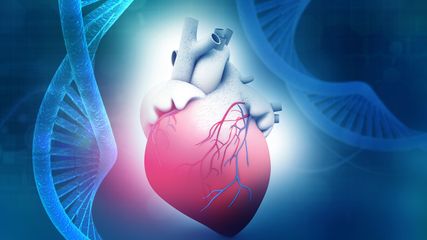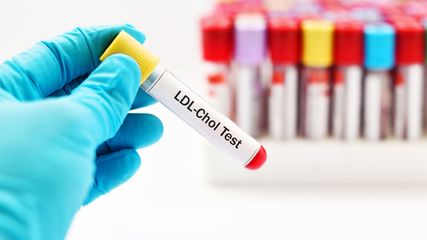
©
Getty Images/iStockphoto
Should we skip a meal every day, or indulge in a spermidine-rich diet?
Jatros
Autor:
Dr. Mahmoud Abdellatif
Department of Cardiology<br> Medical University of Graz<br> E-mail: mahmoud.abdellatif@medunigraz.at
30
Min. Lesezeit
13.12.2018
Weiterempfehlen
<p class="article-intro">Human life expectancy is increasing in a disproportionate rate to our healthy lifetime. Thus, the extra years we gain are rather lived in disease. Such ominous consequence of aging can be avoided by caloric restriction. For those who cannot endure food deprivation, the caloric restriction mimetic spermidine may offer a promising alternative.</p>
<p class="article-content"><div id="keypoints"> <h2>Keypoints</h2> <ul> <li>Aging, hypercaloric diets and sedentariness are major risk factors for frailty and disease.</li> <li>Caloric restriction, without malnutrition, promotes health and prolongs life span.</li> <li>Spermidine-rich diet mimics the benefits of caloric restriction without having to cut down food intake.</li> </ul> </div> <h2>Background</h2> <p>Over recent decades, increased average life expectancy has brought about a global rise of age-related chronic diseases. Among these, cardiovascular disorders pose an enormous burden on public health and economy and their death toll will continue to rise in absence of effective interventions. In addition, premature cardiovascular disease is fostered by a prevalence of obesity due to chronic consumption of hyper-caloric diets and sedentary lifestyle. Therefore, an extended life span comes at the expense of health loss, disability and poor quality of life. The reason for such disparity between life span and health span (i.e., disease-free life period) is likely the failure of pharmacotherapy to sufficiently target the specific mechanisms driving health deterioration in advanced age. Hence, it is of paramount importance to develop more effective anti-aging strategies to improve cardiac and general health, especially among elderly people.</p> <h2>Caloric restriction is a proven anti-aging strategy, but can we stick to it?</h2> <p>The amount of daily food intake, diet composition, meal timing, and even intermeal interval length can profoundly affect both our health and life span. That said, there is a clear consensus that caloric restriction – a dietary intervention of caloric intake reduction without incurring malnutrition – effectively reduces age-related harm on living cells and promotes longevity in all tested organisms, such as yeast, fungi and flies as well as mammals, including mice and non-human primates, thus, likely also humans. Such wondrous ability of caloric restriction to promote longevity is thought to be due to evolutionary-preserved and cell-protective processes that are activated upon nutrient and energy deficit. One such protective process is autophagy or ‘self-eating’, which is responsible for cellular cleaning and recycling. On the one hand, autophagy protects against cell stress by eliminating damaged proteins and lipid droplets, which otherwise may impair normal functions and even might cause cell death. On the other hand, degraded cellular contents during autophagy generate end-products, which, besides being a fuel for energy production, can serve as building blocks to produce new cellular components. <br />Over the course of lifetime, the ability of many cell types to activate autophagy goes down and, thus, the amount of cellular waste accumulates disproportionately as we grow old. Caloric restriction keeps up autophagic activity and thereby maintains cellular fitness, improves health and extends life span. However, adhering to caloric restriction for extended periods is practically challenging, not to mention that caloric restriction is contraindicated for pregnant women and youngsters. In addition, some individuals get too motivated that they confuse caloric restriction with food abstinence, which leads to malnutrition and many undesirable side effects. For these reasons, the search for compounds, preferably natural, that could mimic the beneficial effects of caloric restriction without having to endure cumbersome dietary adjustments is highly required.</p> <h2>Spermidine mimics the effects of caloric restriction</h2> <p>The Mediterranean diet, which consists of a high intake of olive oil, vegetables, fruits, nuts, cereals and legumes, moderate consumption of dairy products and fish and only a minor amount of sweets is a widely accepted example of a healthy diet. In fact, individuals regularly consuming this diet are recognized to have better cardiovascular and cognitive function. While the exact reasoning for the beneficence of this diet is still not clear, it is known to contain high levels of vitally important molecules called polyamines, such as spermidine. <br />Despite the fact that the polyamine spermidine exists naturally in our body, spermidine levels are largely affected by its uptake in food and synthesis by gut microflora. Spermidine is present in many natural foods, but in varying amounts. For instance, food containing high amounts of spermidine include wheat germ, soy beans, aged cheese, shiitake mushrooms, green peas, nuts, apples, pears, and broccoli, just to mention a few (Fig. 1). As spermidine levels decrease with age in humans, it is possible that increasing spermidine amount could counteract aging. More importantly, spermidine activates autophagy similar to caloric restriction. Therefore, it could be used as a caloric restriction mimetic to restore youthful health during aging.</p> <p><img src="/custom/img/files/files_datafiles_data_Zeitungen_2018_Jatros_Kardio_1805_Weblinks_s22_abb1.jpg" alt="" width="1138" height="957" /></p> <h2>Spermidine rescues the heart from aging and disease</h2> <p>Like in other tissues, autophagy declines with aging also in the heart. Such a reduction of autophagy is associated with impaired heart function, especially during diastole (i.e., relaxation), and increased hypertrophy (i.e., cardiac wall thickness), both of which facilitate the development of cardiac diseases. In this regard, a recent study has shown that spermidine supplementation might turn back the clock on age-related decline in cardiac health. In fact, mice supplemented with spermidine in their drinking water had better cardiac function with reversed age-related hypertrophy. In addition, spermidine improved the energy-producing (mitochondrial) capacity and structural integrity of cardiomyocytes – the cardiac muscle cells responsible for contraction and pumping action of the heart. Such improved cardiac health in spermidine-supplemented mice was related to a beneficial effect on their life span as well. When spermidine was administered early in life, it prolonged life span by up to 15 % , while later supplementation of spermidine (to already aged mice) increased chances of survival by 10 % . <br />In addition to aging, hypertension is one of the leading risk factors for cardiovascular disease and mortality. Spermidine administration to a strain of rats that develop hypertension upon salt intake not only delayed the development of hypertension, but also improved cardiac muscle elasticity, and protected the animals from heart failure. Interestingly, spermidine loses most of its cardiovascular protective effects in mice that have a genetic defect in the heart, which disables their autophagic activity. Thus, spermidine benefits seem to be primarily mediated through stimulation of autophagy. Taken together, spermidine protects the heart against aging and hypertension and extends life span similar to caloric restriction, at least, in preclinical testing.</p> <h2>Does spermidine also work in humans?</h2> <p>Epidemiological evidence from the Bruneck Study provides promising evidence that, even in humans, a spermidine-rich diet has a health-promoting effect (Fig. 2). In this study, 829 participants from the Bruneck area (South Tyrol, Italy) were included and their dietary habits were documented by means of questionnaires under the guidance of nutritionists. Thus, the amount of spermidine taken in food could be calculated and subsequently compared with the incidence of disease and rate of death in these persons. The analysis of a 20-year follow-up period (1995-2015) revealed that increased dietary spermidine intake is associated with reduced blood pressure and lower risk of heart failure and other cardiovascular diseases (a composite of acute coronary artery disease, stroke and vascular death). In addition, people consuming a spermidine- rich diet had significantly reduced rate of death, including cardiovascular-related, cancer-related and overall mortality. <br />Evidence that spermidine could have profound effects on cardiac health and may even lengthen life is extremely encouraging and deserves much attention at a time when the need to reduce the increasing burden of age-related disease is pressing. The idea that we could increase life span by making adjustments to our diets without the need to reduce caloric intake or take expensive medications is captivating. Bearing this in mind, clinical trials are the next step to confirm that spermidine could directly improve cardiac and general health in humans. Until then, it wouldn’t do any harm to start eating a few more nuts.</p> <p><img src="/custom/img/files/files_datafiles_data_Zeitungen_2018_Jatros_Kardio_1805_Weblinks_s22_abb2.jpg" alt="" width="1094" height="927" /></p> <p><strong>Acknowledgement:</strong><br /> The authors acknowledge support from the Austrian Science Fund (FWF) through the grants P27637-B28 and I3301-B31 (ERA-CVD, MINOTAUR)</p></p>
<p class="article-footer">
<a class="literatur" data-toggle="collapse" href="#collapseLiteratur" aria-expanded="false" aria-controls="collapseLiteratur" >Literatur</a>
<div class="collapse" id="collapseLiteratur">
<ul> <li>Abdellatif M, Sedej S et al.: Autophagy in cardiovascular aging. Circ Res 2018; 123(7): 803-24</li> <li>Eisenberg T, Abdellatif M et al.: Cardioprotection and lifespan extension by the natural polyamine spermidine. Nat Med 2016; 22(12): 1428-38</li> <li>Kiechl S et al.: Higher spermidine intake is linked to lower mortality: a prospective population-based study. Am J Clin Nutr 2018; 108(2): 371-80</li> <li>Madeo F, Eisenberg T et al.: Spermidine in health and disease. Science 2018; 359(6374): eaan2788</li> </ul>
</div>
</p>
Das könnte Sie auch interessieren:
ESC gibt umfassende Empfehlung für den Sport
Seit wenigen Tagen ist die erste Leitlinie der ESC zu den Themen Sportkardiologie und Training für Patienten mit kardiovaskulären Erkrankungen verfügbar. Sie empfiehlt Training für ...
ESC-Guideline zur Behandlung von Herzvitien bei Erwachsenen
Kinder, die mit kongenitalen Herzvitien geboren werden, erreichen mittlerweile zu mehr 90% das Erwachsenenalter. Mit dem Update ihrer Leitlinie zum Management kongenitaler Vitien bei ...
Inclisiran bei Patienten mit Statinintoleranz wirksam und sicher
Eine Analyse statinintoleranter Patienten aus dem Phase III Studienprogramm ORION zeigt, dass Inclisiran die LDL-Cholesterinspiegel kardiovaskulärer Hochrisikopatienten, die kein Statin ...


